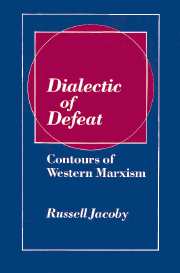Book contents
- Frontmatter
- Contents
- Preface
- Introduction
- Chapter 1 Conformist Marxism
- Chapter 2 The Marxism of Hegel and Engels
- Chapter 3 From philosophy to politics: the inception of Western Marxism I
- Chapter 4 From politics to philosophy: the inception of Western Marxism II
- Chapter 5 The subterranean years
- Chapter 6 Class unconsciousness
- Journal abbreviations used in notes
- Notes
- Index
Chapter 2 - The Marxism of Hegel and Engels
Published online by Cambridge University Press: 04 August 2010
- Frontmatter
- Contents
- Preface
- Introduction
- Chapter 1 Conformist Marxism
- Chapter 2 The Marxism of Hegel and Engels
- Chapter 3 From philosophy to politics: the inception of Western Marxism I
- Chapter 4 From politics to philosophy: the inception of Western Marxism II
- Chapter 5 The subterranean years
- Chapter 6 Class unconsciousness
- Journal abbreviations used in notes
- Notes
- Index
Summary
Unorthodox Marxism is unthinkable without Hegel. The irreplaceable starting and returning points for surpassing conformist Marxism are found in Hegel. From Gramsci to Merleau-Ponty, Marxists escaped the constraints of orthodoxy by tapping Hegelian waters. Critical Marxism obtained coherence and significance in countries where Hegelian thought remained alive: Italy and Germany. Conversely, where a Hegelian tradition never rooted, dissipated, or arrived late – in the United States, England, France – orthodox Marxism not only dominated but suffocated alternatives.
Yet this assertion is too crude and requires qualifications. Apart from the difficulty of identifying national traditions of Marxism, the relationship between Hegel and a critical Marxism explodes a simple cause and effect. Diverse schools of Marxism have appealed to Hegel. In the nineteenth century Russian Hegelianism was second to none. In the twentieth century Soviet as well as European Marxism rest on Hegelian bases. Yet a pattern emerges that is more than a pattern: It illuminates the logic and essence of Marxism. The Hegel that has informed (and sometimes decorated) Marxism has been divided into two types. Two Hegelian traditions crystalized, and each infused two major Marxisms of the twentieth century, Soviet and European.
The failure to discern the two Hegelian traditions obscures the history of Marxism. Partly because of the division of intellectual labor, the distinction between the two Hegels has rarely been studied. Russian specialists regularly concluded that Soviet Marxism is Hegelian in form and inspiration. Conversely, specialists of European history argued that Western Marxism remains fundamentally Hegelian.
These judgments are accurate, but imprecise and unilluminating. Soviet and European Marxism relied on antagonistic Hegelian traditions. This is more than an interesting (or uninteresting) fact.
- Type
- Chapter
- Information
- Dialectic of DefeatContours of Western Marxism, pp. 37 - 58Publisher: Cambridge University PressPrint publication year: 1981

